US Presidential Election Betting 2024
 Betting on the US Presidential election historically has never been particularly big in the UK, that was until Donald Trump’s election in 2016. Bookmakers expected Trump to be no more than a protest vote for white-nationalists, offering high prices even the day before the result.
Betting on the US Presidential election historically has never been particularly big in the UK, that was until Donald Trump’s election in 2016. Bookmakers expected Trump to be no more than a protest vote for white-nationalists, offering high prices even the day before the result.
That shortsightedness cost betting companies millions as savvy punters who saw through media reports made a tidy packet on the result.
The bookies were hit further with both the UK Brexit result and the 2017 UK General Election and so it is highly unlikely they will give much skewed odds again. Even though Donald Trump lost in 2020 the controversy around the election means it has now become a global affair and with literally billions bet on the last election 2024 looks likely to be the most bet on election ever.
Many people in the US itself cannot bet on the result but that is not the case in the UK and Europe. If you fancy a punt on who the next US president will be then we have collated some of the best promotions and deals that could add value to your wagers. Further down you can read about the election, controversies, format and history.
US Presidential Election Betting Offers for 2024
This event has not started yet, please check back nearer the time. For other offers see our main loyalty page.
2024 Presidential Election

When Donald Trump lost the 2020 election to Joe Biden, what followed was months of deliberate attempts to muddy the waters surrounding the United States of America’s election procedures. Claims that the election was somehow ‘stolen’ from the incumbent were nonsense from the start, but the lack of any sort of media oversight in the US meant that they could be repeated time and again on the likes of Fox News.
Whatever your personal opinion on Donald Trump, the fact that he was so willing to see the American political system blow up just for the sake of it is something that will almost certainly have a profound effect in the country for generations to come. That people were able to storm the US Capitol Building and make their way into the speaker’s office is something that will go down in history for all of the wrong reasons.
Indeed, the false claims about the election were still being spouted by the President and members of the Republican Party in the wake of the insurrection in Washington. The years following it will be filled with the more moderate members of the Grand Old Party desperately trying to restore its tarnished reputation in the hopes of being able to win power back in 2024, though whether they’ll succeed remains to be seen.
What we do know is that virtually the whole country is likely to be contested over ahead of the 2024 election. A record number of people voted early in 2020 because of the Covid-19 pandemic gripping the country; something that is unlikely to happen in 2024. That early vote made it appear as if some Red states were turning Blue and vice-versa, because of the nature of how different states counted various ballot types.
Race is likely to prove a crucial factor in 2024, with the ever-shifting demographics in the United States of America almost certain to influence elections for the next few decades. Arizona, Georgia and Wisconsin will all be swing states in 2024, whilst the likes of Pennsylvania, Michigan, North Carolina, and possibly both Nevada and Florida won’t be decisive but will almost certain be in play.
Who Will The Democratic Candidate Be?
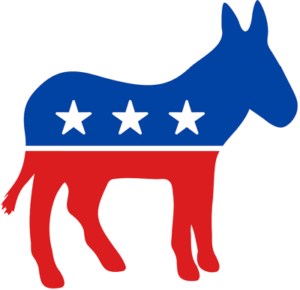 Obviously there’s simply no way to know who the candidate will be for the Democratic Party until we know whether Joe Biden is likely to run again or not. The fact that he was 78-years-old when he was inaugurated means that it’s highly unlikely that he’ll choose to go again in 2024, with Kamala Harris almost certain to be the front-runner after serving a term as a popular and highly visible Vice-President.
Obviously there’s simply no way to know who the candidate will be for the Democratic Party until we know whether Joe Biden is likely to run again or not. The fact that he was 78-years-old when he was inaugurated means that it’s highly unlikely that he’ll choose to go again in 2024, with Kamala Harris almost certain to be the front-runner after serving a term as a popular and highly visible Vice-President.
The problem that the Democrats have got is that the far-left of the Party is only growing in influence and stature. Many thought that Bernie Sanders’ time was up when he lost out on the Democratic nomination to Hilary Clinton ahead of the 2016 election, but he remained a popular choice for some prior to 2020. Whilst he’ll be older than Biden in 2024, his side of the Party has some well-known and popular voices.
The most obvious of these is Alexandria Ocasio-Cortez, the Democrat from New York. A keen advocate of the likes of the Green New Deal, AOC, as she is often referred to as, was one of the most popular bets placed for next President as soon as the 2020 election had been settled. Whilst LeBron James was also listed as a 150/1 punt, Ocasio-Cortez is the new generation of politicians that follows in the footsteps of Sanders.
Whether the Democrats will be able to unite both their own Party and the country as a whole during Biden’s Presidency obviously remains to be seen, but if they fail then AOC will almost certainly be one of the names that will be touted for a Presidential run in 2024. Presidential candidates need to be over the age of 35 to run, which Ocasio-Cortez will be a few weeks before the 2024 election takes place.
What About The Republicans?

The fact that Donald Trump was such a divisive figure during his time in office, combined with the fact that invoking the 25th Amendment as his term came to a close, means that the former reality show host is unlikely to be the Republican candidate for 2024. Indeed, the fact that he considered pre-emptively pardoning himself suggested that he wasn’t exactly whiter-than-white, in a political sense at least, when he was President.
Mike Pence served his term out as Vice-President, meaning that he’ll certainly be a front runner for the GOP. Whether his association with Trump means that he’s tainted or not is something that we’ll only really get a sense of when the nominations are made. The Republicans have been far more predictable in years gone by, but the post-Trump era is one with plenty of questions they’ll need to answer.
From Ronald Reagan through to George HW Bush, GOP nominees had previously run an unsuccessful campaign before being nominated, with the exception of George W Bush. Will that format return for 2024? If so then Mitt Romney ticks that box. If not then it’s possible that a member of the Trump household might end up being the nominee instead, with Ivanka and Donald Junior both on the list of possibles.
The final name worth keeping an eye on is Josh Hawley. Though only a junior senator from Missouri, he is telegenic and a pro-Trump candidate. His decision to defy Mitch McConnell’s call that the ratification of the votes for President should go uncontested also made him a household name for those with a confederacy flag in their front yard. That alone might be enough to encourage him to run for the highest office in the land.
Profile of Joe Biden
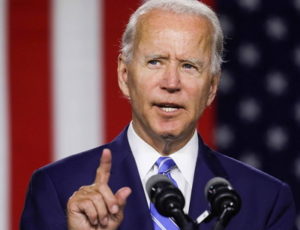 Christened Joseph Robinette Biden Junior, he was born on the 20th November 1942 in Scranton, Pennsylvania. He studied at the University of Delaware and then earned a law degree from Syracuse University in 1968. That was two years after he’d married Neilia Hunter, who sadly died in 1972. He remarried five years later, being wed to educator Jill Jacobs, who became step-mother to Beau and Hunter, sons from his first marriage.
Christened Joseph Robinette Biden Junior, he was born on the 20th November 1942 in Scranton, Pennsylvania. He studied at the University of Delaware and then earned a law degree from Syracuse University in 1968. That was two years after he’d married Neilia Hunter, who sadly died in 1972. He remarried five years later, being wed to educator Jill Jacobs, who became step-mother to Beau and Hunter, sons from his first marriage.
He was elected to the US senate in 1972, becoming the sixth-youngest senator in American history at the age of 29. It’s fair to say that he was a career politician from that point onwards, being re-elected six times. He eventually retired from the senate in order to become Barack Obama’s running mate for the 2008 Presidential Election. They were then re-elected in 2012, meaning he served eight years as Vice-President.
His life has been one of indomitable spirit, having seen his wife and daughter die in a car accident in December of 1972 when Christmas shopping. He himself had brain surgery for a leaking intracranial berry aneurysm in 1988, whilst his son Beau died from a brain tumour in 2015. A moderate Democrat, Joe Biden ran for President twice, firstly in 1988 then again in 2008, eventually winning election in 2020.
Profile of Kamala Harris
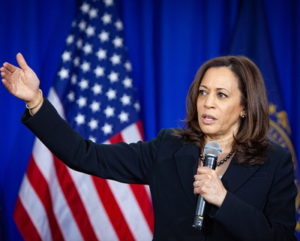 Pronounced Kommolla, Kamala Devi Harris was born in Oakland, California on the 20th of October 1964. She attended both Howard University and the University of California, Hastings College of the Law, beginning her career in the District Attorney of Alameda County’s office. She was elected to the District Attorney of San Francisco’s office in 2003, then then became Attorney General in 2010.
Pronounced Kommolla, Kamala Devi Harris was born in Oakland, California on the 20th of October 1964. She attended both Howard University and the University of California, Hastings College of the Law, beginning her career in the District Attorney of Alameda County’s office. She was elected to the District Attorney of San Francisco’s office in 2003, then then became Attorney General in 2010.
She was elected as the junior senator from California in 2016, becoming only the second African American woman to serve in the Senate. Her rise to political stardom has been somewhat meteoric, gaining a public profile for her questioning of Donald Trump’s Supreme Court nominee Brett Kavanaugh. She initial ran for the Democratic Presidential nominee in 2020 but dropped out before the primaries.
She was named as Joe Biden’s running mate in August of 2020, winning the ticket in the November election. The daughter of a biologist from India and a professor in economics from British Jamaica, she was the first woman of South Asian descent to serve in the Senate and the first female Vice-President. Indeed, she will be the highest-ranking female elected official in U.S. history. She is married to Doug Emhoff.
The Trump Presidency
 The Presidency of Donald Trump has been one of lows and even lower lows, depending on which side of the aisle you find yourself. Indeed, you could probably come up with an individual timeline for his time in office on a whole heap of individual topics, from race relations to the environment. Such was the nature of his period as President that so much happened it’s difficult to keep track.
The Presidency of Donald Trump has been one of lows and even lower lows, depending on which side of the aisle you find yourself. Indeed, you could probably come up with an individual timeline for his time in office on a whole heap of individual topics, from race relations to the environment. Such was the nature of his period as President that so much happened it’s difficult to keep track.
It seemed as though Trump’s main aim upon taking office was to dismantle anything that Barack Obama did in the White House. So it was that his first Executive Order was to begin dismantling what was known as ObamaCare, but was more specifically the Patient Protection and Affordable Care Act. Not long after, he withdrew the United States of America from the Trans-Pacific Partnership.
Another key policy of Trump’s was to promise the building of a wall to stop Mexicans from getting into America illegally. Another Executive Order was signed to try and achieve this, coming under the guise of Border Security. Part of that also included the separation of immigrant children from their parents, with the youngsters being housed in literal cages whilst their parents were often deported.
Donald Trump was often called a racist by his critics, with the likes of his Travel Ban policy being a large part of the reason why. People from certain nations were banned from entering the United States under the order, which was extremely controversial. Moving away from the Two State policy in the Middle East was also a controversial move, as was his decision to deny climate change.
In fact, President Trump’s time in office was filled with so many controversial moments that to discuss them all here would be nearly impossible. Whether it be the rumours of working with Russia to win the 2016 election or simply ensuring that his family was able to use the Presidency as a method of making themselves richer, he will forever be viewed as one of the most controversial holders of the oval office of all time.
All of that culminated with the insurrection in Washington in January of 2021 on the day that the House and Senate were to ratify the Presidential votes carried out in the election. Having stoked the nonsense rumour of electoral fraud for months, the President watched on as his supporters and white supremacists stormed the US Capitol building. His supporters did what he’d been encouraging them to do and he said he ‘loved them’ in
Trump’s Major Controversies
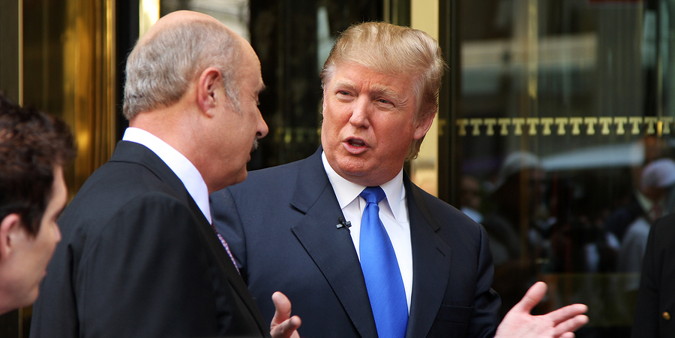
It’s fair to say that expectations for Trump were low before he even took office, with many of his critics feeling that he failed to live up to them.
The key thing that has dominated his presidency to date is a series of controversies, of which there have been many. In fact, there’s a decent argument that there have been too many to date to list them all, so here we’ll look at some of the biggest ones.
Russia
Without doubt the biggest controversy of the Trump presidency to date surrounds his relationship with Russia, specifically with regards to the 2016 election and potential interference. Such was the extent to which there was suspicion surrounding what happened that the Democrats appointed a special prosecutor to look into what happened.
Robert Mueller’s Special Counsel Investigation resulted in 34 individuals and 3 companies being indicted, with as many as 5 Trump associates or campaign officials pleading guilty to charges. The report itself wasn’t made public, but when giving testimony Mueller himself said, “If we had confidence that the president clearly did not commit a crime, we would have said that”.
Stormy Daniels
During the presidential campaign Donald Trump allegedly paid porn actress Stormy Daniels, whose real name is Stephanie Clifford, $130,000 in order to stop her from testifying about an extra-marital affair that he had with her a decade before. It was a story that enveloped his presidency for a time, not least of all because the Republican Party is known as being one based on the idea of family values.
Trump had married his current wife, Melania, in 2005 and they had a son together, Barron, the following year, so he was married at the time of the alleged affair. Daniels said that trump didn’t mention either his wife or son during their time together, when the sex was ‘nothing crazy…textbook generic’.
James Comey
There has been something of a revolving door of staff members for the Trump administration, but the firing of FBI Director James Comey in May of 2017 set Washington tongues wagging. It’s believed by many that Comey was essentially responsible for Donald Trump winning the election, given that his announcement in 2016 that he was investigating emails found on Hilary Clinton’s laptop tipping the Republican over the edge for many voters that mistrusted Clinton.
Whether that’s fair or not, Trump chose to fire Comey when he was in the middle of investigating the alleged interference in the 2016 election by Russian operatives. It was seen by many as an attempt to stop the investigation dead in its tracks, with Trump having also asked Comey to drop his investigation into Trump’s former National Security Adviser, Michael Flynn.
Profile Of Donald Trump
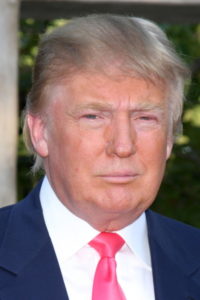 Donald John Trump was born on the 14th of June 1946 in Queens, New York City. He studied economics at the Wharton School, University of Pennsylvania and in 1971 took control of his family’s real-estate business. He renamed it as the Trump Organisation, expanding it into Manhattan as well as building casinos, hotels, skyscrapers and, of course, golf courses.
Donald John Trump was born on the 14th of June 1946 in Queens, New York City. He studied economics at the Wharton School, University of Pennsylvania and in 1971 took control of his family’s real-estate business. He renamed it as the Trump Organisation, expanding it into Manhattan as well as building casinos, hotels, skyscrapers and, of course, golf courses.
Between 1996 and 2015 he owned the Miss Universe and Miss USA beauty pageants. He was also the producer and host of The Apprentice in the US between 2003 and 2015. His net worth is estimated to be in the region of $3.1 billion. Having not revealed his tax returns, however, it’s impossible for that figure to be accurately spoken of. By April of 2018 Trump and the businesses that he ran had been involved in as many as 4,000 state and federal legal actions.
Donald Trump married Ivana Zelníčková in 1977, having three children together. They divorced in 1992, with Ivana citing his affair with Maria Maples as the main reason for the split. Maples and Trump then married in 1993 and had one child but got divorced in 1999. He then married Melania Knauss in 2005, having one son. He has numerous associations with Christian spiritual leaders, describing himself as Presbyterian.
Format Of US Elections
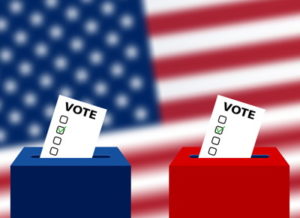 If you’ve ever heard anything about presidential elections in the United States of America then you’ll have heard people talk about the electoral college. That’s got nothing to do with educational establishments but rather is the body of electors that was established under the United States Constitution.
If you’ve ever heard anything about presidential elections in the United States of America then you’ll have heard people talk about the electoral college. That’s got nothing to do with educational establishments but rather is the body of electors that was established under the United States Constitution.
There are 538 electors, which means that a candidate needs to win 270 electoral votes or more in order to be elected president. Each individual state is allowed to decide how their electors are chosen, with the state’s number of electors being equal to the combined number of Senate and House of Representatives in the state’s membership.
Not everyone is a fan of the electoral college system, predominantly because it’s possible for a person to lose the popular vote, which is the overall number of votes of people in the country, and yet win the election because they won the necessary number of votes from the electoral college.
Added to that the fact that candidates can essentially just rule out needing to campaign in certain states that they won’t win and you can see why some feel it doesn’t represent the people effectively.
The people vote for electors, who then cast their vote for the president and vice-president according to how the people that the represent voted. Presidential elections happen every four years, with voters going to the polls on the first Tuesday after November 1st. The winning president is then sworn into office in January of the following year.
Traditional Swing States
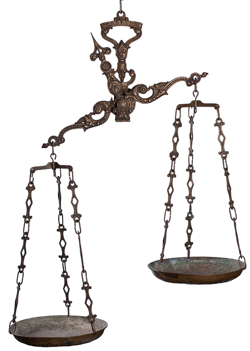 There are numerous factors that are taken into account when considering whether or not a state is a ‘swing state’. It’s not as though all states that have been swing states for one election will be in the next one, but there are certainly a selection of states that are considered to be ‘traditional’ swing states. There are seven such states, which are as follows:
There are numerous factors that are taken into account when considering whether or not a state is a ‘swing state’. It’s not as though all states that have been swing states for one election will be in the next one, but there are certainly a selection of states that are considered to be ‘traditional’ swing states. There are seven such states, which are as follows:
- Iowa
- New Hampshire
- Virginia
- Florida
- Nevada
- Colorado
- Ohio
It’s common for states to swing back and forth depending on who it is that is running for president and what they represent. The idea of a swing state is one in which it’s a marginal call regarding which way the state is going to go, so both parties tend to concentrate time and advertising money on them in order to try to swing things in their favour.
Some people, such as the pollster Nate Silver, use the term ‘swing state’ to mean states that could swing the election one way or another if they were to change hands. Perhaps the most famous example of this came in 2000 when the election between George Bush and Al Gore was so close that it literally came down to which of them won Florida, with the former doing so by a margin of 537 votes.
History of the US Election

The manner of US presidential elections was established by Article 2 of the US Constitution. It was seen as a compromise at the time between those that wanted Congress to choose the next president and those that believed it was a job for the people. In 53 of the 58 elections held between the first one and the 2016 election, the winner of the popular vote also won the electoral college vote.
The first ever elected president in the United States was George Washington, who was followed by John Adams and then Thomas Jefferson. Washington was unopposed in both of his presidential bids, with the first proper presidential race coming about in 1796 when Adam and Thomas Jefferson went head-to-head. The two battled it out again four years later, this time with a reverse result.
This was all during the country’s more formative years, of course. Perhaps the most dominating factor in the nineteenth century was that of slavery, with things coming to a head under the presidency of Abraham Lincoln. It led to the American Civil War, with Lincoln eventually ending slavery before being assassinated by John Wilkes Booth in 1865.
There have been any number of controversial elections over the years, not least of all in 1968 when Richard Nixon defeated George Wallace in an election that was mainly about the civil rights movement and the Vietnam war. Nixon’s presidency was a controversial one all of its own, with the Watergate Scandal earning him the nickname ‘Tricky Dicky’ and eventually forcing him to resign.
One of the most controversial of all presidential elections of the modern era came about in 2000 when George W. Bush went up against Al Gore. It was the first one since 1888 that saw the president elected by winning the electoral college and losing the popular vote. Gore had conceded on the night of the election, only to retreat his concession when it turned out that Florida was too close to call.
In the end the issue of the vote in Florida went to the Supreme Court who sided in favour of Bush and ruled out the possibility of a recount for the state of Florida, meaning that Bush won by 271 electoral college votes to Gore’s 266, though Gore won by 50,996,582 to 50,465,062 in the popular vote.
The absolute most controversial modern election has to be 2020 when President Donald Trump failed to concede the election while making unsubstantiated claims of mass voter fraud. A flurry of legal challenged ensued from Trump, all unsuccessful as he used any means to hold on to power.
This culminated in a mob on Trump supporters, who he had spoken to at a rally earlier in the day, marching on Capitol Hill to prevent the election result being certified by the senate 14 days before inauguration. Five people were killed in the chaotic scenes. Trump then refused to attend Joe Biden’s inauguration ceremony, the first time a president has done so since Andrew Johnson in 1869.
Previous US Presidential Election Results (Since 1916)
| Election Year | Winner | % Popular Vote | Party |
|---|---|---|---|
| 1916 | Woodrow Wilson | 49.2% | Democrat |
| 1920 | Warren Harding | 60.3% | Republican |
| 1924 | Calvin Coolidge | 54.0% | Republican |
| 1928 | Herbert Hoover | 58.2% | Republican |
| 1932 | Franklin D. Roosevelt | 57.4% | Democrat |
| 1936 | Franklin D. Roosevelt | 60.8% | Democrat |
| 1940 | Franklin D. Roosevelt | 54.7% | Democrat |
| 1944 | Franklin D. Roosevelt | 53.4% | Democrat |
| 1948 | Harry S. Truman | 49.6% | Democrat |
| 1952 | Dwight D. Eisenhower | 55.2% | Republican |
| 1956 | Dwight D. Eisenhower | 57.4% | Republican |
| 1960 | John F. Kennedy | 49.7% | Democrat |
| 1964 | Lydon B. Johnson | 61.0% | Democrat |
| 1968 | Richard Nixon | 43.4% | Republican |
| 1972 | Richard Nixon | 60.7% | Republican |
| 1976 | Jimmy Carter | 50.1% | Democrat |
| 1980 | Ronald Regan | 50.7% | Republican |
| 1984 | Ronald Regan | 58.8% | Republican |
| 1988 | George H. W. Bush | 53.4% | Republican |
| 1992 | Bill Clinton | 43.0% | Democrat |
| 1996 | Bill Clinton | 49.2% | Democrat |
| 2000 | George W. Bush | 47.9% | Republican |
| 2004 | George W. Bush | 50.7% | Republican |
| 2008 | Barack Obama | 52.9% | Democrat |
| 2012 | Barack Obama | 51.1% | Democrat |
| 2016 | Donald Trump | 46.0% | Republican |
| 2020 | Joe Biden | 66.7%# | Democrat |
| 2024 | ? | ? | ? |
# – Highest voter turnout rate since 1900 (73.7%), with a record 159.6 million people voting

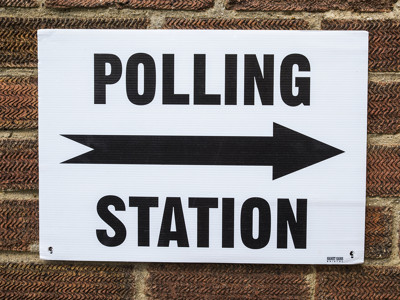 ;
;

